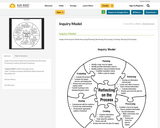
Image of the Inquiry Model discussing Planning, Retrieving, Processing, Creating, Sharing & Evaluating
- Subject:
- Education
- Educational Technology
- Material Type:
- Primary Source
- Date Added:
- 10/05/2018

Image of the Inquiry Model discussing Planning, Retrieving, Processing, Creating, Sharing & Evaluating
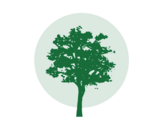
Inspiring Success: First Nations and Métis PreK-12 Education Policy Framework was renewed in collaboration among First Nations and Métis organizations, Elders and Traditional Knowledge Keepers, post-secondary and provincial Prekindergarten to Grade 12 education stakeholders, and the Ministry of Education. The vision of Inspiring Success is a provincial Prekindergarten to Grade 12 education system that foundationally places Indigenous knowledge systems, cultures and languages within the structures, policies and curricula to ensure an equitable and inclusive system that benefits all learners. As such, this renewed policy framework guides actions at all levels of the education sector and is aligned with the goals of the Education Sector Strategic Plan. Inspiring Success supports reconciliation, treaty education, Indigenous cultures and languages in the classroom, as well as the infusion of Indigenous perspectives and ways of knowing into all renewed curricula to benefit all learners.
The ministry is committed to facilitate the sharing of information, tools and processes useful to school divisions, teachers and administrators in planning and implementing actions in First Nations and Métis education, in alignment with the policy goals. Improving First Nations, Métis and Inuit student achievement and the learning outcomes for all students is a shared responsibility throughout the PreK-12 education sector.
As a first step, it is recommended to become familiar with the policy framework.
Implementation
We heard from First Nations and Métis organizations, Elders, provincial education stakeholders and post-secondary institutions about how crucial implementation will be for this policy framework. We acknowledge the considerable number of initiatives and programs put in place by government and by school divisions; however, there is more work to do. A variety of tools and resources are available to assist with creating awareness, building support, planning and implementation, including a webinar presentation, PowerPoint slideshow, promotional handout and dialogue questions. Many links are provided within each goal area as suggested resources for teachers and administrators. More will be added as new information and tools become available.

The Ministry of Education’s Student Achievement and Supports branch has developed Instructional Supports for Diverse Writers to support the ESSP’s At Grade Level in Reading, Writing and Math priority. The document focuses on instructional considerations, practices and strategies for students to develop and improve their writing skills. The intended audience for the document is the middle level (grades 4-9) classroom teacher.

"Guided by the International Convention on the Elimination of All Forms of Racial Discrimination, the International Day for the Elimination of Racial Discrimination recognizes that the injustices and prejudices fueled by racial discrimination take place every day. Observed annually on March 21, it commemorates the day police in Sharpeville, South Africa, opened fire and killed 69 people at a peaceful demonstration against apartheid "pass laws" in 1960."
This site from the Government of Canada explains the day, racial discrimination, provides tips to fight racism, provides as history of racism in Canada, and provides a digital toolkit.

The International Day of Mathematics (IDM) is a worldwide celebration. Each year on March 14 all countries will be invited to participate through activities for both students and the general public in schools, museums, libraries and other spaces.
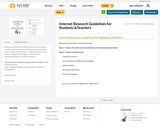
Effective Internet Research Skills Overview
Step 1: Create a list of key words and phrases on the topic being researched
Step 2: Choose an internet tool:
· Subject Directories
· Search Engines and Meta-Search Engines
· Subject Guides
· Specialized Databases
· Site Search Engines
.....
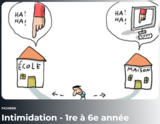
Ce dossier thématique regroupe plusieurs ressources au sujet de l'intimidation afin d'appuyer le personnel enseignant à discuter du sujet avec leurs élèves.
Voici 9 ressources au sujet de l'intimidation à partager avec vos élèves.

Ce dossier thématique regroupe plusieurs ressources au sujet de l'intimidation afin d'appuyer le personnel enseignant à discuter du sujet avec leurs élèves.
Ce site contient 8 ressources au sujet de l'intimidation à partager avec vos élèves de la 7e à la 12e année.

This short video will give you an overview of the Resource Bank.
Welcome!
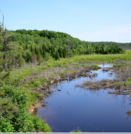
« Découvre la géologie, la chimie et l’écologie des lacs et des étangs. »
*Texte, images, illustrations, vidéo:
-Les écosystèmes lentiques
-Géologie
-Chimie
-Écologie
*Matériel annexe: vidéos (changements climatiques et vidéo satellite accélérée) et articles supplémentaires.

This video provides a brief introduction to CommonLit's Pre-Assessment, which is available to teachers and students in grades 3-12.
Includes: multiple choice & Reading passages.
Available until November, so be sure to assign it prior to that.
help@commonlit.org if you have questions.

On TV shows like "CSI," viewers get to watch as investigators find and collect evidence at the scene of a crime, making blood appear as if by magic and swabbing every mouth in the vicinity. Many of us believe we have a pretty good grip on the process, and rumor has it criminals are getting a jump on the good guys using tips they pick up from these shows about forensics.
But does Hollywood get it right? Do crime scene investigators follow their DNA samples into the lab? Do they interview suspects and catch the bad guys, or is their job all about collecting physical evidence? In this article, we'll examine what really goes on when a CSI "processes a crime scene" and get a real-world view of crime scene investigation from a primary scene responder with the Colorado Bureau of Investigation.

Step by step instructions with screen shots providing directions for using the MSS Family Portal

This video provides and introduction to the Four Seasons of Reconciliation program.
"4 Seasons of Reconciliation is a unique 3-hour online course that promotes a renewed relationship between Indigenous Peoples and Canadians through transformative learning about truth and reconciliation."
Sun West Teachers - to register for the course email dlchelp@sunwestsd.ca

Jason’s story is one of many. Listen, learn and share at www.passagescanada.ca
Passages Canada is a national storytelling initiative of Historica Canada that nurtures cross-cultural dialogue in Canadian communities. Our volunteer speakers share their personal experiences of identity, culture and immigration with groups of all ages. Passages Canada is generously funded by TD Bank Group and Citizenship and Immigration Canada.
“I was born in Seoul, South Korea. My mom and dad immigrated to Toronto when I was a just 3 months old. They dreamed of becoming entrepreneurs. In 1978 they opened one of the first businesses in Toronto’s Koreatown.
As a teenager, I wanted nothing to do with the family business. I didn't speak Korean; I wasn’t interested in my parents’ Korean culture. I just wanted to be like the other Canadian kids. My mom finally kicked me out of the house.
Five years ago, my dad got sick. I decided it was time to embrace my roots. I started managing the restaurant. I even learned to speak Korean.
I am a Korean-Canadian, proud of what my family has built.”
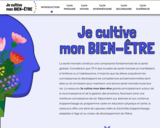
La ressource Je cultive mon bien-être gravite principalement autour de la reconnaissance et de la gestion des émotions, favorisant ainsi une meilleure connaissance de soi. Répondant aux attentes et aux contenus d’apprentissage du programme-cadre en éducation physique et santé, la ressource offre une série de capsules vidéo et d’activités d’apprentissage adaptées à l’âge et au niveau de développement de l’élève.
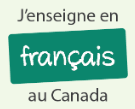
Ce site est votre porte d'entrée pour découvrir et utiliser les ressources gratuites et de grande qualité liées à l'apprentissage du français langue première en milieu minoritaire, au Canada.

Voici un site qui peut améliorer la compétence orale des apprenants du français langue seconde.
On y trouve des ressources d’apprentissage professionnel pour les enseignantes et enseignants de français langue seconde (FLS).
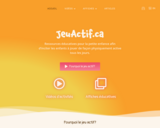
Ressources éducatives pour la petite enfance afin d’inciter les enfants à jouer de façon physiquement active tous les jours.
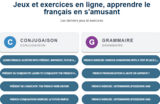
Jeux et exercices en ligne, apprendre le français en s'amusant. La plupart sont gratuits.
**Vous pouvez aussi vous abonner pour en recevoir plus.